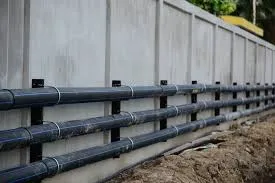Oct . 03, 2024 16:04 Back to list
pvc hose pipe
Understanding PVC Hose Pipes Versatility and Benefits
PVC hose pipes have emerged as an essential tool in various industries, ranging from agriculture to construction. The acronym PVC stands for polyvinyl chloride, a synthetic plastic polymer that is both durable and flexible, making it an ideal material for hose production. The versatility and benefits of PVC hose pipes make them a popular choice for numerous applications.
Understanding PVC Hose Pipes Versatility and Benefits
Furthermore, the lightweight nature of PVC hoses contributes to their ease of use. Being significantly lighter than metal or rubber alternatives, they can be easily transported and maneuvered, reducing fatigue during extended use. This is particularly beneficial for workers in construction or landscaping, who often need to carry multiple hoses throughout their tasks. The flexibility of PVC also allows it to bend and conform to various shapes, making it ideal for tight spaces or complex setups.
pvc hose pipe

Another key benefit is the cost-effectiveness of PVC hose pipes. They are generally more affordable than their counterparts made from other materials. This affordability does not compromise quality; instead, it makes PVC hoses accessible to a wider range of consumers, including hobbyists, small business owners, and large enterprises alike. Their longevity and minimal maintenance requirements further enhance their value, allowing users to enjoy a reliable product without frequent replacements.
In terms of applications, PVC hoses find utility in numerous sectors. In horticulture, they are used for drip irrigation systems and greenhouse watering, providing a controlled and efficient way to deliver water to plants. In the construction industry, PVC hoses are indispensable for transporting water to sites for mixing concrete or dust suppression. Their resistance to abrasion and punctures makes them suitable for high-demand environments, where durability is paramount.
Moreover, PVC hoses come in a variety of sizes, colors, and specifications, catering to different needs and preferences. This diversity allows consumers to select the ideal hose for their specific requirements, whether they need a thin, flexible hose for delicate tasks or a thicker, sturdier option for heavy-duty work. Many manufacturers also offer customization options, further ensuring that users can find the perfect hose for their applications.
In conclusion, PVC hose pipes stand out as a practical choice for a wide array of tasks across different industries. Their durability, lightweight nature, cost-effectiveness, and versatility make them an invaluable asset for both professional and personal use. As industries continue to evolve and expand, the demand for reliable, efficient, and adaptable tools like PVC hoses is likely to grow, solidifying their role as a staple in various operational environments. Whether for irrigation, construction, or maintenance tasks, PVC hose pipes prove to be an essential solution for many practical needs.
-
High-Quality PPR Pipes and Fittings Durable ERA PPR & PVC PPR Solutions
NewsJul.08,2025
-
Black HDPE Cutting Board - Durable, Non-Porous & Food Safe HDPE Plastic Cutting Board
NewsJul.08,2025
-
High-Quality CPVC Panel Durable HDPE & PVC Panels Supplier
NewsJul.08,2025
-
Double PE Welding Rod Supplier - High Strength, Durable & Versatile Welding Solutions
NewsJul.07,2025
-
High-Quality PVC-O Pipe Supplier Durable 75mm PVC Pipe & Connections Leading PVC Pipe Company
NewsJul.07,2025
-
HDPE Drainage Pipe Supplier – Durable & Corrosion-Resistant Solutions
NewsJul.06,2025

